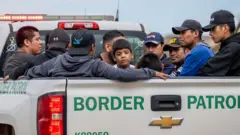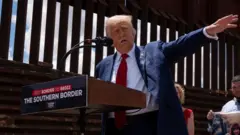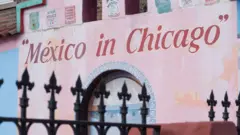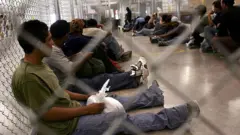The law of 1798 with which the US enclosed thousands of Japanese in concentration camps and that Trump wants to relive for his mass deportation plan


Image source, Getty images
The largest mass deportation operation in the history of the United States. That is what Donald Trump promised during his campaign and in the opening speech of his second term.
It was clear that their harsh migratory policies are not only directed against migrants who reach the southern border, sometimes in caravans, but also against immigrants without legal immigration status who already live on US soil.
And to help his expulsion from the US be broad, his administration has set his eyes on a law of the 18th century created in times of war: the Law of Foreign Enemies (Alien enemy act).
“Our government does not protect our American citizens respectful of the law, but it does provide refuge and protection to dangerous criminals who have illegally entered our country from all over the world,” Trump said in his inaugural speech.
“Every irregular entry will be stopped to the US.
This 227 -year -old standard gives the presidents the authority to stop and expel foreign citizens from countries with which their nation is at war. That is, nations with which the US maintains real hostilities.

Image source, Getty images
The law is known for its role in the imprisonment of Germans, Italians and Japanese who lived in the US more than 30,000 of these foreign citizens passed the war in prisoners in internment camps, because the government considered them potentially dangerous.
But although Trump has been planning with his advisors for months how to fulfill his promise to carry out this unprecedented offensive against legal and illegal immigration, he has not invoked the norm formally, for more than the name in speeches and interviews.
Consequences
If you decide to use it instead of the existing immigration law, “the Alien enemy act He would give the Trump government a very broad executive branch without restrictions to stop and expel undocumented immigrants at will, “explains BBC Mundo Dan Tichenor, professor of Political Science at the University of Oregon.
Vice President JD Vance declared that deportations could start with a million people.
“The rule authorizes the presidents to expedite the deportation process, leaving non -citizens without the possibility of appealing to the immigration courts,” says Tichenor.
By eliminating the legal process and the appeals to which immigrants can go, times would be reduced and allowed faster deportations already large scale, as Trump promised.

Image source, Getty images
“This law allows the president to discriminate against immigrants based on his country of citizenship or his birthplace, that is, of his ancestry. And, as the US Supreme Court has recognized, discrimination based on the Ancestry implies the same serious concerns as race -based discrimination, “recalls Katherine Yon Ebright, of the Brennan Center for Justice.
The lawyer believes that Venezuelans in the US could be the most vulnerable group.
“There are some indications that I could use it to order the detention and deportation of all Venezuelans over 14 years, including permanent residents, who are not US citizens,” says the researcher.
Venezuelans, Salvadorans and Mexicans
But Yon Ebright admits that Trump is more likely to point to “considered dangerous” or “considered members of the Aragua train”, a bloody band of Venezuela that has expanded through Latin America and has a presence in the US.
As the Law of Foreign Enemies does not need evidence that determines whether or not it belongs to the gang, “any Venezuelan could be considered a threat and be subject to persecution, even if there is no real basis for that accusation,” adds the researcher.
According to the most recent estimates of the Institute of Migration Policy, based in Washington, there are approximately 11 million undocumented immigrants living in the US.
Only Mexico already represents more than half of that figure, while Central America represents 15%. Experts believe that this places these populations in the spotlight of the law.

Image source, Getty images
“Trump plans to say that the US is at war with drug cartels that control certain Latin American countries as a pretext to invoke the law. Such attempt will surely be judged by federal courts,” says Professor Tichenor.
And it is that both the text and the history of the Law of Foreign Enemies have enormous legal obstacles to the Trump administration.
First because the US is not in an open war and second everything indicates that it will be difficult for the Trump team Demonstrate that immigration is a foreign hostile “invasion”.
Behind his argument lies the idea of Trump – repeated in innumerable speeches – that there are foreign governments that intentionally send legions of unwanted and violent undocumented immigrants to the US.
On several occasions, The president expressly cited Mexico and Venezuela. That is why analysts believe that there is a risk that the Republican Administration will label some Latin American countries as narco -state rebels at war with the USA.
“The law of 1798 is clear that an ‘inquiring or folding incursion must be made by a’ nation or foreign government ‘so that it can be invoked.”

Image source, Getty images
“However, Congress has not declared war on any country in more than 80 years, nor has any other government launched an invasion against US territory, “recalls Tichenor.
The presidents who have invoked the law in the past did so during war conflicts, such as James Madison in the War of 1812 or Woodrow Wilson in World War I and Franklin Roosevelt in World War II, when used to intern 31,000 foreigners from Japanese, German and Italian ancestry.
“A law of war times has no place to apply in peacetime. If Trump continues anyway, he will surely face legal challenges by those affected, defense groups and by states,” says Yon Ebright.
Criminalization of immigrants
“The question that the Courts will have to resolve is whether the ‘invasion’ contemplated by the law of 1798 is a traditional invasion, military style, of armed bodies, or if their interpretation can cover the people who come to the US. UU. Looking for work or fleeing persecutions, “says academic César Cuauhtémoc García Hernández, a specialist in migratory studies and professor of civil rights and freedoms at the Moritz Law Faculty of the State University of Ohio.
“What we see today is that Trump equates immigrants who arrive from Honduras fleeing from poverty or Venezuela fleeing from Maduro’s political regime, with a German soldier captured after a battle of World War II.”
“The fear of immigrants has increased during recent decades. It is almost impossible to hear politicians talk about immigration without linking it to crime,” he adds.
“A century ago there was talk of immigrants as a workforce that strengthened the economy of a country, now we lived times as immigrants are treated as criminals. And that rhetoric, has expanded under the influence of Donald Trump in the Republican party and Obviously, in the presidential office, “explains the professor.
Another part of the problem, he points out, is that living in the US without documentation is not a criminal offense of any kind. It is a violation of the Civil Administrative Law of the Federal Government, but it is not a criminal offense.

Image source, Getty images
Title 42
It is not the first time that Trump disregards an old law to deport migrants.
During the pandemic, his first administration alleged Risks to public health as justification to close the borders of the country and quickly deport migrants trying to cross illegally.
He did it by bringing title 42, an old public health law that allowed to block the passage of migrants before they could set foot in the country and even limited the opportunity to request asylum.
“The American dream will soon return,” Trump said in the inaugural speech. But surely for many in Latin America that dream now becomes further. The last word is likely to have the Supreme Court.

Subscribe here To our new newsletter to receive every Friday a selection of our best content of the week.
And remember that you can receive notifications in our app. Download the latest version and act.





